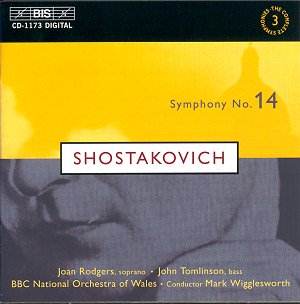This is the next disc in what started off
as a potentially complete Shostakovich cycle by these performers. Given
the current state of the recording industry, and the long periods between
issues, I wonder if this series is running out of steam. I have not
been too satisfied by earlier issues (Symphonies Nos. 5, 6, 7 and 10),
but the current issue, one niggle apart, is in a different class.
I first heard Wigglesworth's interpretation of this symphony at a sweltering late night Prom in 1995. The soprano was to have been Nancy Gustafson, but she was replaced at the last minute by Roberta Alexander. The bass soloist was, as in this recording, John Tomlinson. Notwithstanding the extreme heat in the hall, and the effect of it being the second concert of the evening, the performance was superb, and it was my first experience of this conductor in this repertoire. Needless to say, I approached this disc with some trepidation, given my response to other recordings in this BIS Series.
The current issue is quite different however. The two soloists are superb, John Tomlinson and Joan Rodgers sounding very idiomatic albeit not singing in their home tongues. In more famous recordings, some of the vocal contributions (more authentic in accent) sometimes sound quite uncomfortable with slavonic wobbles to the fore. Nothing like this here. There are no distractions to spoil Shostakovich's inspiration from the texts of Lorca (2), Apollinaire (6), Küchelbeker (1) and Rilke (2). All of these texts have the unifying theme of death and so the entire work has an overriding impression of gloom and terror which throughout the work's hour is extremely persuasive.
No doubt the atmosphere of the work was significantly affected by the conditions of its development. Shostakovich had suffered a heart attack in 1966 from which he still hadn't fully recovered in 1969. Suffering also from polio which had prevented the use of his right hand, and confined to hospital during a flu epidemic these were the conditions he was experiencing during the work's conception.
During the first performance in Leningrad (now St. Petersburg) there was a disturbance caused by a member of the audience, thought initially to be an organised protest, not uncommon in those days. It transpired later however to be one of the audience leaving hurriedly on becoming ill. Shostakovich was somewhat amused to hear later that the identity of the person who had died was none other than one of the composer's biggest critics and tormentors. To die during a symphony on death was somewhat ironic, given the identity of the victim.
The content of the 11 poems, although on the subject of death, is more influenced by protest against death. The composer was inherently optimistic - difficult to understand given the conditions under which he existed, and the work therefore displays what is quite common in a number of his works - a juxtaposition of opposites.
So, to sum up: a superb performance by all concerned; a worthy addition to the catalogue. I mentioned one minor niggle at the beginning of this review. This is to do with the dynamic range of the recording. The beginning is at a very low level, almost inaudible at normal listening levels. If this is corrected, then later on the windows will surely rattle. This may be fine for some listeners, but I found it quite disconcerting. Still it is quite manageable - thank God for remote controls.
John Phillips

